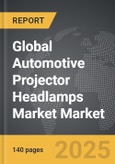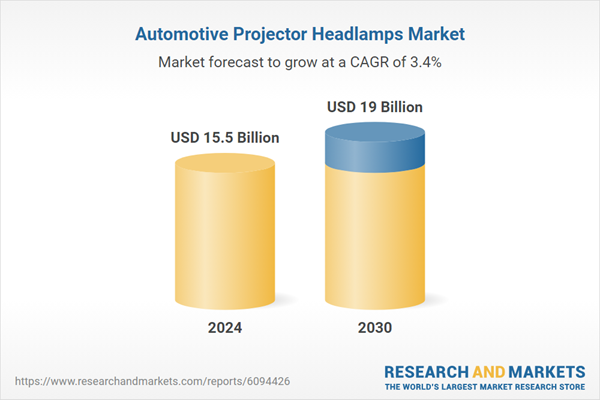Global Automotive Projector Headlamps Market - Key Trends & Drivers Summarized
How Are Technological Advancements Redefining the Automotive Lighting Landscape?
Over the past decade, the automotive projector headlamps market has undergone a remarkable transformation, fueled by rapid advancements in lighting technologies. The shift from traditional reflector and halogen-based systems to projector-based units represents more than a change in light source - it signifies a comprehensive rethinking of vehicular lighting functionality and form. Projector headlamps are characterized by their use of a tightly focused lens mechanism that allows for precise beam control, enabling better road illumination and reduced glare for oncoming traffic. This marks a stark improvement over conventional systems, which often suffer from scattered light patterns and inefficiency. With LEDs and laser diodes becoming mainstream, manufacturers now integrate these sources into projector modules for better brightness, longevity, and reduced power consumption. Innovations such as matrix LED systems, which can selectively turn on or off individual diodes to avoid dazzling other drivers, are setting new standards in headlamp performance. These systems also integrate seamlessly with vehicle cameras and sensors to offer adaptive lighting, which responds to road curvature, traffic, and weather conditions in real time. Luxury vehicle brands were early adopters of these features, but economies of scale and modular lighting platforms have made it feasible for mid-tier and even budget vehicles to include similar technologies. The aesthetic value of projector headlamps, with their compact design and high-end appearance, is also a crucial factor driving their adoption across vehicle classes. In parallel, the proliferation of digital and software-driven lighting controls has allowed manufacturers to experiment with custom beam patterns, intelligent illumination, and animated DRL (daytime running light) effects, expanding the role of lighting from a safety tool to a design and branding element.What Role Do Regulatory Frameworks and Safety Standards Play in Shaping Demand?
Global regulatory bodies have had a profound impact on the direction and speed of projector headlamp adoption, especially as vehicle safety and energy efficiency take center stage in policy development. In Europe, regulations by the Economic Commission for Europe (ECE) have laid the groundwork for intelligent lighting systems, mandating technologies like adaptive front-lighting systems (AFS) and adaptive driving beams (ADB) to be compliant with performance-based standards. These systems offer enhanced driver visibility at night while ensuring minimal glare for oncoming vehicles. In the United States, recent changes by the National Highway Traffic Safety Administration (NHTSA) now permit the use of ADB systems, marking a significant regulatory shift that harmonizes U.S. standards with global practices. These developments have opened new doors for OEMs to bring globally harmonized projector-based systems into the American market, increasing the competitive intensity among manufacturers. Insurance agencies like the IIHS are also raising the bar by including headlamp performance in their safety evaluations, prompting automakers to prioritize projector technologies in order to achieve higher crash safety ratings and gain consumer trust. Environmental regulations further add impetus by encouraging energy-efficient lighting as part of broader emissions reduction goals. The European Green Deal and China's aggressive push toward carbon neutrality are examples of how lighting efficiency is becoming an indirect regulatory demand. These multifaceted regulations are not only driving product development but are also shaping the strategic decisions of OEMs and Tier-1 suppliers regarding technology partnerships, R&D investments, and manufacturing localization. In this context, compliance is no longer just a legal necessity - it is becoming a competitive differentiator.Why Is Consumer Preference Shifting Toward Aesthetic and Performance-Based Lighting Solutions?
The evolution of consumer expectations is dramatically influencing the trajectory of the automotive projector headlamps market, as buyers increasingly prioritize style, performance, and personalization in their vehicle purchases. Headlamps are no longer viewed as mere functional components but as a central element of vehicle design that can elevate a car's perceived value and brand identity. Projector headlamps, with their sharp beam patterns and visually distinct lens structures, deliver a modern and premium look that resonates strongly with younger and design-conscious buyers. This shift is especially visible in urban markets, where consumers often choose vehicles based on aesthetic and tech-forward features. Automakers are responding by offering projector headlamps with customizable lighting effects, such as sequential turn signals, animated welcome sequences, and tunable color temperatures, often enabled through app-based controls or in-vehicle infotainment systems. In emerging markets like India, Indonesia, and Mexico, where first-time buyers are entering the auto market in large numbers, projector headlamps are increasingly offered as standard or mid-trim options in compact SUVs and hatchbacks. This trend is further reinforced by the rapid growth of electric vehicles (EVs), which require sleeker, aerodynamic designs - making compact projector headlamps a perfect fit. The aftermarket is also playing a crucial role, offering retrofit projector kits that allow older vehicles to adopt modern lighting aesthetics and performance, thereby broadening the consumer base beyond new car buyers. Moreover, the rise of digital influencers and auto enthusiasts on social media has turned vehicle lighting into a showcase element, creating aspirational value that influences broader purchasing trends. As vehicles become extensions of personal style and technological sophistication, projector headlamps are becoming a defining feature in the modern automotive experience.What's Powering the Market's Upward Momentum and Long-Term Viability?
The growth in the automotive projector headlamps market is driven by several factors rooted in technological evolution, market dynamics, changing consumer behavior, and regional development patterns. On the technology front, the relentless pace of innovation - ranging from matrix LEDs and laser modules to digital micro-mirror devices - is making projector headlamps more efficient, compact, and intelligent. These systems are increasingly capable of real-time adaptation to traffic, terrain, and environmental conditions, which is essential for next-generation driving assistance systems and autonomous vehicles. In terms of end-use segmentation, the luxury vehicle segment continues to lead adoption, but the democratization of advanced lighting via modular designs is propelling growth in the mid-size and compact vehicle categories. Automakers are leveraging economies of scale to bring high-end features into mainstream models without significantly impacting production costs. Consumer behavior is another strong growth lever, with a marked preference shift toward high-performance lighting solutions that blend safety, style, and sustainability. As car buyers become more tech-savvy, lighting becomes a key differentiator that influences purchase decisions, particularly in markets with growing middle-class populations and increasing per-capita incomes. Regionally, Asia-Pacific stands out as the fastest-growing market, led by China, India, and South Korea, where a booming automotive manufacturing base and government incentives are driving adoption. Meanwhile, North America and Europe remain strongholds of innovation and regulatory leadership, setting benchmarks that ripple across global supply chains. Strategic collaborations between automakers, tech companies, and Tier-1 lighting suppliers are accelerating the commercialization of emerging technologies, including AI-integrated lighting controls and vehicle-to-infrastructure communication via headlamp projection. Together, these elements form a robust foundation that ensures the continued expansion and long-term relevance of projector headlamps in the global automotive landscape.Report Scope
The report analyzes the Automotive Projector Headlamps market, presented in terms of market value (US$). The analysis covers the key segments and geographic regions outlined below:- Segments: Type (Halogen Headlamps, LED Headlamps, Other Types).
- Geographic Regions/Countries: World; United States; Canada; Japan; China; Europe (France; Germany; Italy; United Kingdom; Spain; Russia; and Rest of Europe); Asia-Pacific (Australia; India; South Korea; and Rest of Asia-Pacific); Latin America (Argentina; Brazil; Mexico; and Rest of Latin America); Middle East (Iran; Israel; Saudi Arabia; United Arab Emirates; and Rest of Middle East); and Africa.
Key Insights:
- Market Growth: Understand the significant growth trajectory of the Halogen Headlamps segment, which is expected to reach US$12.2 Billion by 2030 with a CAGR of a 3.2%. The LED Headlamps segment is also set to grow at 4.1% CAGR over the analysis period.
- Regional Analysis: Gain insights into the U.S. market, valued at $4.2 Billion in 2024, and China, forecasted to grow at an impressive 6.3% CAGR to reach $3.8 Billion by 2030. Discover growth trends in other key regions, including Japan, Canada, Germany, and the Asia-Pacific.
Why You Should Buy This Report:
- Detailed Market Analysis: Access a thorough analysis of the Global Automotive Projector Headlamps Market, covering all major geographic regions and market segments.
- Competitive Insights: Get an overview of the competitive landscape, including the market presence of major players across different geographies.
- Future Trends and Drivers: Understand the key trends and drivers shaping the future of the Global Automotive Projector Headlamps Market.
- Actionable Insights: Benefit from actionable insights that can help you identify new revenue opportunities and make strategic business decisions.
Key Questions Answered:
- How is the Global Automotive Projector Headlamps Market expected to evolve by 2030?
- What are the main drivers and restraints affecting the market?
- Which market segments will grow the most over the forecast period?
- How will market shares for different regions and segments change by 2030?
- Who are the leading players in the market, and what are their prospects?
Report Features:
- Comprehensive Market Data: Independent analysis of annual sales and market forecasts in US$ Million from 2024 to 2030.
- In-Depth Regional Analysis: Detailed insights into key markets, including the U.S., China, Japan, Canada, Europe, Asia-Pacific, Latin America, Middle East, and Africa.
- Company Profiles: Coverage of players such as Allegro MicroSystems Inc., Amphenol Corporation, Analog Devices Inc., Aptiv PLC, BorgWarner Inc. and more.
- Complimentary Updates: Receive free report updates for one year to keep you informed of the latest market developments.
Some of the 36 companies featured in this Automotive Projector Headlamps market report include:
- Aptiv
- Appotronics
- Bosch
- Continental AG
- Cree
- DENSO Corporation
- Fiem Industries
- Guangzhou AES Electronic Tech
- Hella GmbH & Co. KGaA
- Hyundai Mobis Co., Ltd.
- Ichikoh Industries, Ltd.
- Jiangsu Yedi Auto Lamp Co., Ltd.
- Koito Manufacturing Co., Ltd.
- LG Electronics
- Lumax Industries
- Marelli Holdings Co. Ltd.
- Neolite ZKW Lightings Pvt. Ltd.
- OSRAM Licht AG
- Philips Automotive Lighting
- Stanley Electric Co., Ltd.
This edition integrates the latest global trade and economic shifts into comprehensive market analysis. Key updates include:
- Tariff and Trade Impact: Insights into global tariff negotiations across 180+ countries, with analysis of supply chain turbulence, sourcing disruptions, and geographic realignment. Special focus on 2025 as a pivotal year for trade tensions, including updated perspectives on the Trump-era tariffs.
- Adjusted Forecasts and Analytics: Revised global and regional market forecasts through 2030, incorporating tariff effects, economic uncertainty, and structural changes in globalization. Includes historical analysis from 2015 to 2023.
- Strategic Market Dynamics: Evaluation of revised market prospects, regional outlooks, and key economic indicators such as population and urbanization trends.
- Innovation & Technology Trends: Latest developments in product and process innovation, emerging technologies, and key industry drivers shaping the competitive landscape.
- Competitive Intelligence: Updated global market share estimates for 2025, competitive positioning of major players (Strong/Active/Niche/Trivial), and refined focus on leading global brands and core players.
- Expert Insight & Commentary: Strategic analysis from economists, trade experts, and domain specialists to contextualize market shifts and identify emerging opportunities.
Table of Contents
Companies Mentioned (Partial List)
A selection of companies mentioned in this report includes, but is not limited to:
- Aptiv
- Appotronics
- Bosch
- Continental AG
- Cree
- DENSO Corporation
- Fiem Industries
- Guangzhou AES Electronic Tech
- Hella GmbH & Co. KGaA
- Hyundai Mobis Co., Ltd.
- Ichikoh Industries, Ltd.
- Jiangsu Yedi Auto Lamp Co., Ltd.
- Koito Manufacturing Co., Ltd.
- LG Electronics
- Lumax Industries
- Marelli Holdings Co. Ltd.
- Neolite ZKW Lightings Pvt. Ltd.
- OSRAM Licht AG
- Philips Automotive Lighting
- Stanley Electric Co., Ltd.
Table Information
| Report Attribute | Details |
|---|---|
| No. of Pages | 140 |
| Published | February 2026 |
| Forecast Period | 2024 - 2030 |
| Estimated Market Value ( USD | $ 15.5 Billion |
| Forecasted Market Value ( USD | $ 19 Billion |
| Compound Annual Growth Rate | 3.4% |
| Regions Covered | Global |









